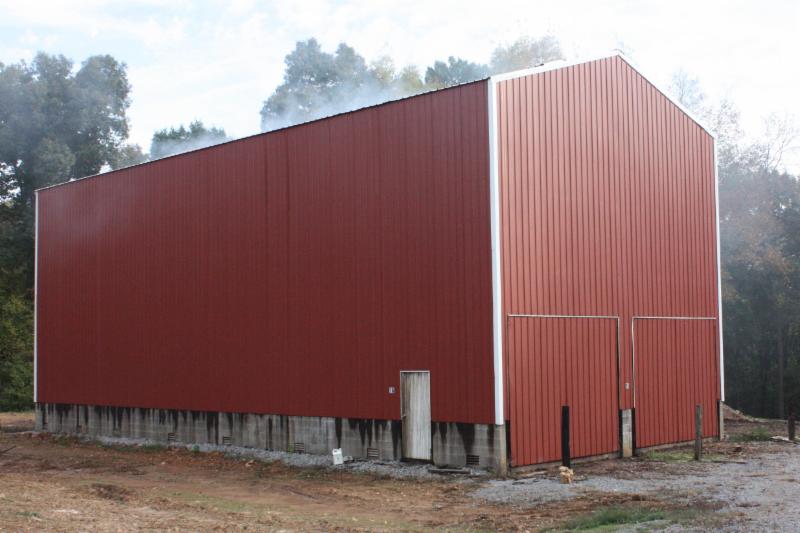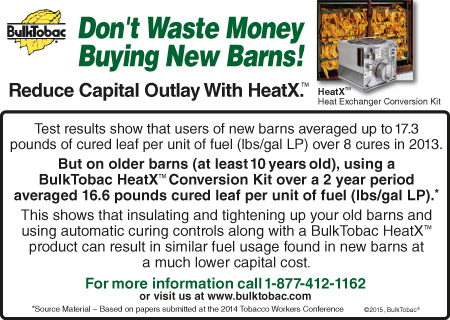 |
| Machinery on the floor at the Southern Farm Show. |
Show time coming up: The Southern Farm Show starts Wednesday, January 31, and runs through Friday at the North Carolina State Fairgrounds in Raleigh. Gates open at 9 a.m. and close at 4 p.m. Admission is free and there is no charge for parking. For more information, go to https://southernshows.com. See list of tobacco-related exhibitors below.
Growers meet: The annual meeting of the Tobacco Growers Association will take place at the show on Friday, February 2. It starts at 10 a.m. in the Holshouser Building and ends at lunch. GAP training will be available afterward.
A show in Tennessee: The Tn-Ky Tobacco Expo will take place February 6, at the Robertson County Fairgrounds in Springfield, Tn. The show runs 8 a.m. to 1:30 p.m., with GAP Training available, and a sponsored lunch will end with a panel made up of Andy Bailey, UT/UK tobacco specialist; Joe Beeler, UT research associate; Emily Pfeufer, UK plant pathologist and Eric Walker, UT/UK tobacco specialist.
Heated tobacco products heating up: A new category of smoking implement-heat not burn or HNB--is making a big impression on foreign markets, though not yet in the U.S. But if it is approved by FDA becomes as popular here as in, for instance, Japan, it could become a significant end use of American tobacco.
The HNB concept revolves around rechargeable electronic device that looks like a pen and heats specially designed tobacco units, generating a tobacco flavored nicotine "aerosol" that the consumer inhales through the mouth. The heat never reaches the level of combustion.
The possibility that U.S. leaf might have a place in HNB industry was a hot topic at the Tobacco Workers Conference in Myrtle Beach, January 15-17. Some observations that were heard:
- The HNB market is a "whole different ball game," said Blake Brown, NC Extension economist. It could potentially be a "game changer" for the tobacco industry, he said.
- HNB products contain much less tobacco than do combustible cigarettes--perhaps one third to one half--but the tobacco will have to be of higher quality.
- It is expected that this tobacco will have to be grown on largescale farms, so flue-cured growers seem more likely to produce HNB tobacco than burley growers (but that could change).
- Growers in Italy and the United States are the likeliest candidates to grow it, Brown said, although Brazil could perhaps get into it also.
- Lamina only: HNB tobacco is strictly a lamina product and will contain no stems, says J. Michael Moore, Georgia Extension tobacco specialist.
- Quality will be very important, and growers will have to adhere strictly to the Good Agricultural Practices (GAP) recommended by the industry. Moore has seen evidence that companies will stress complete freedom in the leaf from residues of certain chemicals and some may have begun already.
- Not enough sugar? Moore thinks a higher sugar content may prove desirable to HNB manufacturers. "Farmers could probably achieve that by producing a little riper crop," he says.
GAP GROWER TRAINING EVENTS
Check with your local Extension Service office for further details.
All meetings listed here are free and presented in English.
- January 30, 9 a.m. Sanford, N.C.
- January 31, 10 a.m. Scottsburg, Va.
- February 1, 6 p.m. Stanford, Ky.
- February 2, 1:30 p.m. Raleigh, N.C. (Southern Farm Show).
- February 5, 9 a.m. Lillington, N.C.
- February 5, 4:30 p.m. Franklin, Ky.
- February 5, 6 p.m. Scottsville, Ky.
- February 6, 8 a.m. Springfield, Tn. (Ky-Tn Tobacco Expo).
- February 8, 5 p.m. Albany, Ky.
- February 8, 6 p.m. New Tazewell, Tn.
- February 13, 6 p.m. Athens, Tn.
- February 13, 1 p.m. Scottsburg, In.
- February 13, 6 p.m. Vevay, In.
- February 19, 12 p.m. Carthage, Tn.
- February 22, 1 p.m. West Union, Oh.
- February 23, 1 p.m. Paoli, In.
- February 19, 6 p.m. Hartsville, Tn.
- February 20, 4:30 p.m. Clarksville, Tn.
- February 20, 6 p.m. Sharpsburg, Ky.
- February 21, 8:30 a.m. Lawrenceburg, Tn.
- February 22, 6 p.m. Maysville, Ky.
- February 26, 4 p.m. Central City, Ky.
- February 26, 6 p.m. Lafayette, Tn.
- February 26, 6 p.m. Bowling Green, Ky.
- February 27, 10:30 a.m. Morehead, Ky.
- February 28, 10 a.m. Hardinsburg, Ky.
- Feb 28, 10:30 a.m. Owensboro, Ky.
- March 1, 10 a.m. Campbridge City, In.
- March 1, 10:30 a.m. Hopkinsville, Ky.
- March 2, 10:30 a.m. Lexington, Ky.
- March 6, 2:30 p.m. Mayfield, Ky.
- March 7, 6 p.m. Greeneville, Tn.
- March 7, 1 p.m. Nashville, Ga.
- March 12, 10:30 a.m. Tifton, Ga.
- March 13, 10:30 a.m. Marion, S.C.
- March 13, 1 p.m. Murray, Ky.
- March 20, 6:30 p.m. Glasgow, Ky.
- March 20, 6:30 p.m. Gray, Tn.
- March 21, 10 a.m. Wilson, N.C.
- March 22, 7 p.m. Bedford, Ky.
- March 26, 6 p.m. Bardstown, Ky.
DATES TO REMEMBER
- January 31-February 2, 9 a.m. Southern Farm Show. N.C. State Fairgrounds, Raleigh, N.C. See below for exhibitor list.
- February 2, 10 a.m. Annual Meeting, Tobacco Growers Association of N.C., Holshouser Building, N.C. State Fairgrounds (in conjunction with Southern Farm Show). Meeting ends with lunch.
- February 6, 8 a.m. Tn-Ky Tobacco Expo. Robertson County Fairgrounds in Springfield, Tn. The show ends with lunch.
SOUTHERN FARM SHOW EXHIBITORS
Exhibits of interest to tobacco growers listed by their location on the N.C. State Fairgrounds.
- 222 Evans Mactavish Agricraft.
- 227 Kelley Mfg. Co. Agricultural equipment.
- 704 (also 8131) Agri Supply. Agricultural materials.
- 807 Mechanical Transplanter Co. Transplanters, seeding equipment.
- 808 BulkTobac (Gas Fired Products). Curing equipment and controls.
Kerr Scott Bldg.
- 1015 Yara North America. Fertility products.
- 1002 TriEst Ag Group. Fumigation supplies.
- 1107 Flue Cured Tobacco Services. Curing controls.
- 1104 GoldLeaf Seed Co. Tobacco seed.
- 1114 BeltWide Inc. Transplant technology.
- 1115 Transplant Systems. Greenhouse systems.
- 1116 Cross Creek Seed. Tobacco seed.
- 1121 AAA Scale Co.
- 1201 Carolina Greenhouse & Soil Company.
- 1202 Reddick Equipment Company Inc.
- 1302 Mid-Atlantic Irrigation Co.
Exposition Bldg.
- 3127&8609 Benchmark Buildings & Irrigation. Transplanters/irrigation.
- 3135 Southern Container Corporation of Wilson. Bale sheets and packaging.
- 3311 Flame Engineering. Weed control with flame.
- 3522 First Products Inc. Fertilizer boxes for cultivators and tool bars.
- 3605 MarCo Mfg. Tobacco machinery.
- 4018 Conklin Company. AgroVantage System to boost genetic potential.
- 4035 Bio-Organic Catalyst.
Scott Tent
- 7025 Drexel Chemical Company. Sucker control chemicals.
- 7027 ABI Irrigation. Irrigation equipment.
Tent 1
- 7302 Fairbanks Scale
- 7334 BJ Williamson Greenhouses.
Outdoors
- 8039 Vause Equipment Co. Farm equipment.
- 8206 Wilson Manufacturing. Farm trailers
- 8204 Equipmax. Tobacco spray equipment.
- 8217 Granville Equipment. Tobacco Machinery.
- 8510 Walters Air Assist Plant Release System. Plant release system.
- 8301 De Cloet SRL. Tobacco machinery.
- 8507 World Tobacco. Bulk fertilizer handling equipment. Curing barns.
- 8546 & 227 Kelley Mfg. Co. Agricultural equipment.
- 8701 Tytun Ltd. Bulk flue-curing barns.
- 8705 Long Tobacco Barn Co. Bulk tobacco curing barns.


 possible for a grower to do everything in his control and still see NNN levels above 1 ppm if a wet curing season occurs. We don't believe this proposed standard is achievable consistently every year with our current technology."
possible for a grower to do everything in his control and still see NNN levels above 1 ppm if a wet curing season occurs. We don't believe this proposed standard is achievable consistently every year with our current technology."  acre, over 200 pounds more than the 2016 yield of 2,021. Consequently, production in 2017 is forecast at 472,200 pounds, up from 431,450 pounds in 2016.
acre, over 200 pounds more than the 2016 yield of 2,021. Consequently, production in 2017 is forecast at 472,200 pounds, up from 431,450 pounds in 2016.







